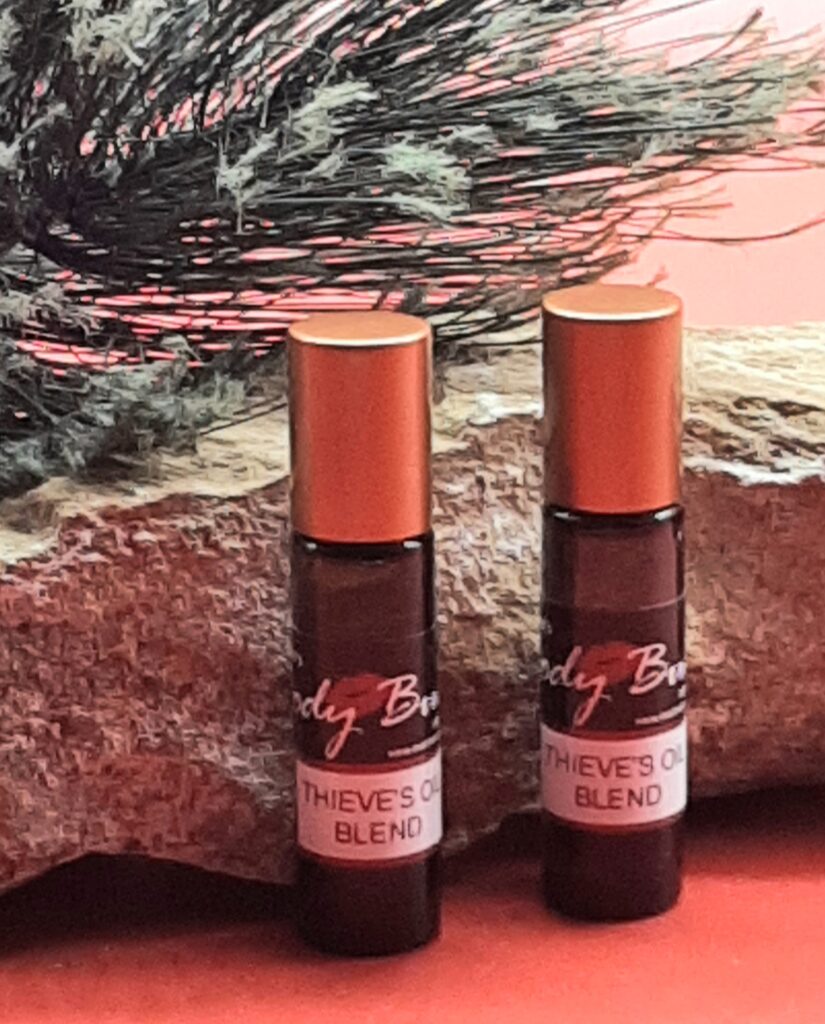
Did you know there is a National Hugging Day (January 21)? I am a devoted hugger, and I don’t need a special day to remind me; but if you miss freely hugging as much as I do, this day may just be the catalyst to get us back into enjoying such a comforting action. How do we do that safely these days?!?!
With seemingly endless variations of the Covid virus cropping up, the pandemic woes seem to keep some of us wary of hugging too much – or at all. So, I decided to do something about it, personally. Then, I realized it’s time to share…
I remembered “Thieves Oil“, also known by variations on that name (such as 3-, 4-, or 5- Thieves Oil). If you’re unfamiliar with it, here is the usual story:
Legend has it, in the 15th century, when the dreaded plague spread across Europe claiming millions of lives, a few thieves in Marseilles were boldly stealing the possessions of people lying dead in the streets. When they were finally caught, authorities were curious as to why they did not succumb to the plague. The thieves didn’t become infected because they had applied a powerful blend of essential oils on their bodies. We now know that blend as thieves oil.
Although official research into this specific blend is limited, the potency of the individual oils in this blend – anti-microbial activity, boosting the immune system, promoting respiratory health, etc – have long been known and used widely throughout the world. (See the source list samples below)
Thieves oil can be used in a variety of applications, such as steam inhalation, diffusion, cleaning household surfaces, and in lotions and oils for your skin. You know where this is going, don’t you?!
A supplier (and aromatherapist) I trust is making this blend for me, but I want to let you know it does cost more than my other natural essential oils. Here is the breakdown of my currently limited supply:
1/3 oz roll-on $25.00 | 1/2 oz bottle $33.00 | 1 oz bottle $62.00
As with any essential oil, always be sure to follow the proper safety precautions when using this oil blend.
Be well, and know yourself to be lucky and healthy,
Martha
**** If you are interested in the specifics, the following information has been culled from multiple sources, and I have more info if you want it.****
THIEVE’S OIL
 There are various recipes that have been popularized over the centuries, but these are the five base ingredients you will find in most thieves essential oil preparations. In most recipes, clove and lemon essential oils are the dominant ingredients.
There are various recipes that have been popularized over the centuries, but these are the five base ingredients you will find in most thieves essential oil preparations. In most recipes, clove and lemon essential oils are the dominant ingredients.
Thieves oil is a blend of several essential oils; most often the base is:
- Cinnamon Bark: antifungal, antibacterial, antioxidant
- Clove: anesthetic, antimicrobial, antifungal, antiseptic, anti-inflammatory
- Eucalyptus: antioxidant, antiviral, antifungal, relieves congestion, antiseptic
- Lemon: anti-inflammatory, antimicrobial, mood booster,
- Rosemary: antioxidative, antimicrobial, antioxidant, antiviral, immune system support
Thieves oil has a rich, spicy aroma. This essential oil blend has potent antiseptic, disinfectant, and antibacterial properties, according to a report published in The American Journal of Essential Oils and Natural Products. It can be commonly used as a home remedy for colds & coughs, as well as for domestic purposes such as house cleaning. However, scientific research is somewhat limited.
Benefits and research
- boosts the immune system
- has antimicrobial properties
- fights nasal and sinus congestion
- promotes respiratory and cardiovascular health
- energizing or uplifting mood
Many of the above benefits are based on anecdotal claims. That means they’re based on personal testimony or experience. Research into thieves oil itself is very limited. An older study found that diffused thieves oil significantly lowered the airborne levels of three different types of bacteria. A lot more research has been done on the benefits of the individual components of thieves oil.
Antimicrobial Properties
- A 2017 study Trusted Source found that low concentrations of cinnamon and clove oil had high antimicrobial activity against persistent cultures of Borrelia burgdorferi, the causative agent of Lyme disease.
- A 2018 study Trusted Source found that vapors of cinnamon oil inhibited the growth of respiratory pathogens like Haemophilus influenzae and Streptococcus pneumoniae in a petri dish. But eucalyptus oil had little activity there.
- A 2012 study Trusted Source showed that eucalyptus oil had antimicrobial activity against two types of bacteria that can cause disease in humans: Escherichia coli (E. coli) and Staphylococcus aureus (skin infections).
- Two studies from 2019 observed that Lemon oil has some antimicrobial properties. And it has been proven in many studies that lemon oil increases energy levels.
All the ingredients in thieves essential oil can have an impact on the immune system, either with antibacterial, antiviral, antiseptic, or antioxidant properties. A 2017 study, published in Cogent Medicine, suggests that essential oil blends can potentially impact cells by improving immunity and speeding up wound healing. This is what made this oil so popular back in medieval times, as it was believed to be a protective shield against the plague.
Thieves oil uses (If you have any concerns about using Thieves oil, discuss them with a healthcare provider first.)
Diffusion Thieves essential oil can be diffused throughout your home, filling the space with a warm, inviting smell, while also helping to purify the air by killing airborne microbes. The National Association for Holistic Aromatherapy (NAHA) suggests adding 50-100 total drops of essential oil to your diffuser and leaving the room with closed doors for a few hours. When you re-enter the room, open all the doors and windows to clear the air.
Lotions and creams You can also add Thieves oil to unscented lotions and creams. These preparations can then be used for purposes such as soothing, cleansing, or helping with wound healing.
Like with massage oils, you’ll need to dilute Thieves oil in the cream or lotion before applying it to your skin.
The National Association for Holistic Aromatherapy recommends the final essential oil concentration be 1 to 2.5 percent for normal skin and 0.5 to 1 percent for sensitive skin.
Steam inhalation When adding essential oils to a bowl of steaming water, the hot water vaporizes the oil, allowing it to be inhaled with the steam. This application may help with respiratory congestion or sinus issues.
To use Thieves oil for steam inhalation, you can do the following:
- Add several drops of thieves oil to steaming water. You may want to start with just a couple drops so the scent isn’t overwhelming.
- Place a towel over your head and lean over the bowl of water.
- Keeping your eyes closed, breathe in deeply through your nose.
Massage You can also make massage oils using essential oils. To do this, the Thieves oil must be diluted in another type of oil, which is called a carrier oil. Don’t apply essential oils directly on the skin unless diluted in a carrier oil. (Jojoba, Coconut, Almond, Sunflower, etc.)
…The total percentage of essential oil shouldn’t exceed 3 to 5 percent of the total solution volume.
If you’re planning to apply massage oil to a large area, consider using a 1 percent solution.
Spray For Household Cleaning You can make A DIY Thieves oil spray with 15 drops of thieves oil, 1 teaspoon of organic witch hazel, and about 2 ounces of distilled water. Put it in a dark spray bottle to avoid the oil from getting degraded. You can use it to disinfect kitchen counters, bathroom spaces, toilet seats, steering wheels, and remove musty smells from shoes or closed spaces. You can also carry it in your handbag to disinfect public restroom spaces before use. Try freshening your carpet or upholstery with this handy spray! [6]
Note: The spray is also used to wash fruits and vegetables, cutting boards, as well as mixed with dishwashing liquid. However, it is best to know if you are allergic to any of the oils before using it in places where it may get accidentally ingested.
- Shake well and spray. You’ll need to shake it every time before you spray.
Skin Reactions
Both cinnamon and clove oil are potential skin irritants. If topical application of thieves oil causes redness, swelling, or itching, avoid using it in the future.
If you’re planning on topically applying thieves oil, conduct a patch test first. To do this:
- Clean your forearm with unscented soap and dry thoroughly.
- Add a small amount of diluted thieves oil to an area on your forearm.
- Cover with a bandage or gauze.
- Leave the covering on for at least 24 hours. Then remove and check for irritation.
It’s also important to note that you can develop sensitivity to these oils over time with repeated application. This is called sensitization.
Photosensitivity
Lemon oil can lead to photosensitivity. This means that exposure to the sun or other ultraviolet radiation can lead to burning or pigmentation changes. When topically applying thieves oil, avoid going out in direct sunlight without proper sun protection.
Potentially Antibacterial Properties
Many people use Thieves essential oil, in small amounts, as a house cleaner due to its antibacterial properties. According to a Journal of Essential Oil Research report, when Thieves oil was diffused in a controlled environment, it significantly may have reduced the number of airborne bacteria and prevented transmission of pathogens. With a fragrant aroma (the cinnamon cuts through the strongest) and powerful antiseptic properties, giving the surfaces in your home a quick wipe with Thieves essential oil can make it much harder for germs and bacteria to take hold.
Word of Caution: Children and pregnant women should avoid using this oil undiluted as cinnamon and clove oil may cause skin irritations. According to a report by Johns Hopkins Medicine, cinnamon bark oil can cause an allergic reaction or irritation. If you are on medication, it is best to check with your doctor before using this oil blend as one of its ingredients, eucalyptus oil can cause certain drugs to be less effective.
The Takeaway
The potential benefits of Thieves oil include boosting the immune system, promoting respiratory health, and fighting microbes.
Although some of these benefits are anecdotal, the individual components of Thieves oil have been shown to have antimicrobial properties, promote wound healing, and may provide pain relief.
Thieves oil can be used for a variety of applications. Like with any essential oil, always be sure to follow the proper safety precautions when using it.
Sources: https://www.organicfacts.net/health-benefits/essential-oils/thieves-essential-oil.html and https://www.healthline.com/health/thieves-oil and https://www.tandfonline.com/doi/full/10.1080/2331205X.2017.1302909 and https://www.sciencedirect.com/science/article/abs/pii/S0306453007002648
Stop by, order online, leave us a review, or tell a friend. It all counts. #ShopSmall
